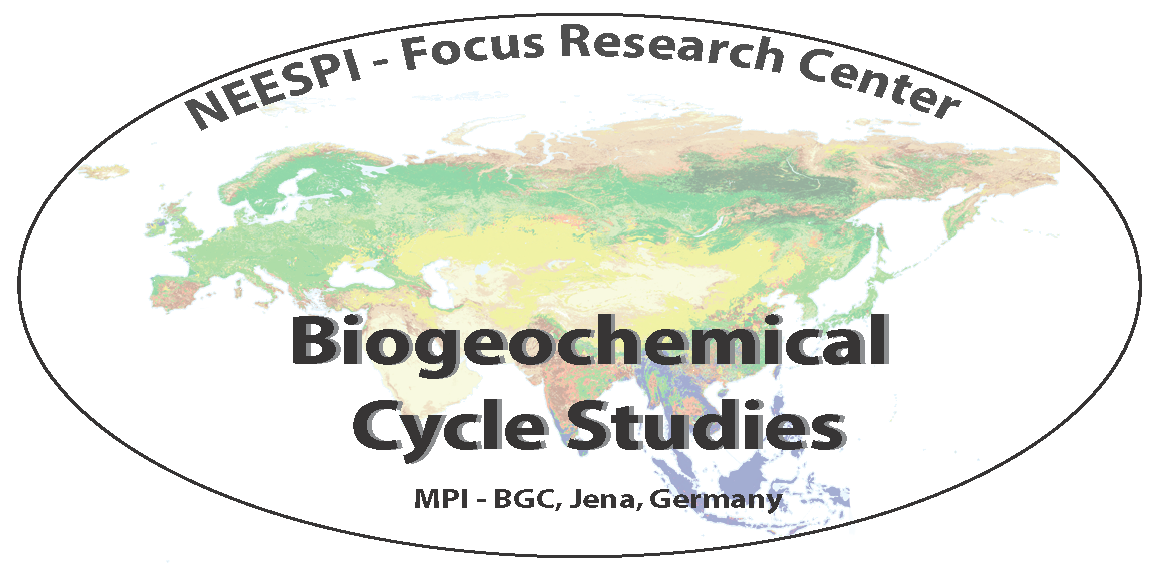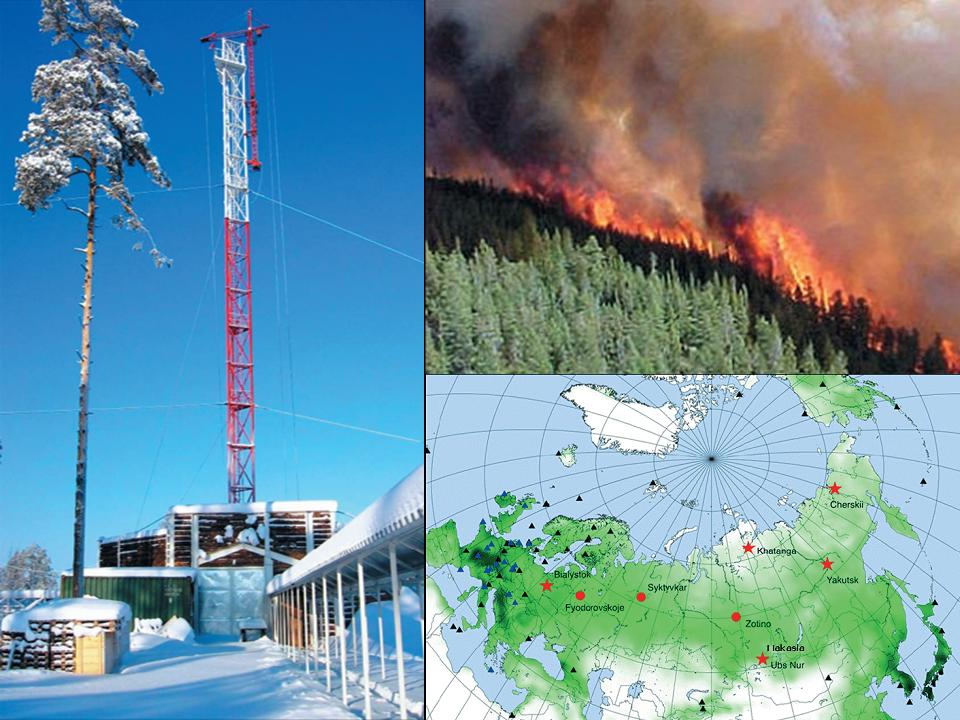First Workshop of the NEESPI Focus Research Center for Biogeochemical Cycles, Max-Planck Institute for Biogeochemistry, Jena, Germany
March 17-19, 2008
Three years ago the Northern Eurasia Earth Science Partnership Initiative (NEESPI) was
established to address large-scale and long-term manifestations of climate and
environmental change in this region (http://neespi.org). Since 2004, NEESPI participants
have been able to seed several waves of research proposals to international and national
funding agencies and institutions and also contribute to the International Polar Year.
Currently, NEESPI is widely recognized and endorsed by several Earth System Science
Partnership Program (ESSP) Programs and Projects and more than 120 individually funded
projects (always with international participation) around the world have been mutually
united to explore the scientifically significant Northern Eurasian region. Studies of
biogeochemical cycles in this region constitute a major research priority in the NEESPI
Science Plan, http://neespi.org/science/NEESPI_SP_chapters/SP_Chapter_2.pdf.
Many of the currently funded NEESPI projects are addressing scientific questions
regarding biogeochemical cycles (http://neespi.org/science/biogeo.html). However, many
of these have origins prior to the establishment of the Initiative. Furthermore, there exist
numerous scientific research projects in the NEESPI domain, which are currently not under
the NEESPI umbrella (Formal participation in NEESPI requires an international research team which includes collaborators from
the NEESPI domain). Therefore, Max-Planck Institute for Biogeochemistry (Jena, Germany) took the lead
and established the NEESPI Focus Research Center (FRC) for Biogeogeochemical Studies over Northern Eurasia.
The FRC objectives are:
• to bring together the research groups involved in biogeochemical cycle studies,
• to foster coordination among them (for example, by coordination of expensive
field studies, sharing of data, joint model simulations),
• to coordinate and harmonize the research plans, and
• to integrate and synthesize the research results for a better understanding of
biogeochemical processes in the NEESPI region and their role in the Earth system.
The Organization of the Workshop was the First step to fulfill these objectives.
After official inaguration of the Focus Research Center, (a) the invited speakers presented the overview lectures
and their opinions how the research of the biogeochemical cycles in Northern
Eurasia should further proceed; (b) the Workshop Participants presented their ongoing research (more than 30 talks and posters were presented);
and (c) the third day of the Workshop was devoted to formal (within breakout groups)
and informal discussions devoted to further research planning and formulation of major challenges of studying Biogeogeochemical Processes over the NEESPI domain.
A complete set of presentations and list of the the Meeting participants are below.
Meeting Agenda
• Day 1 Monday, March 17, 20088.30 – 10.00 Introduction and Overview programmatic talks
Ernst-Detlef Schulze, MPI-Jena, Germany History of MPI-Jena research in Siberia (view )
Martin Heimann, MPI-Jena, Germany: The Workshop Objectives ( view )
Kevin Noone, IGBP, Royal Swedish Academy of Sciences, Sweden: IGBP Update for NEESPI ( view )
Pep Canadell, Global Carbon Project, Earth Observation Center, CSIRO, Australia: Vulnerabilities of the Carbon-Climate-Human System at High Latitudes (view )
10.00 Inauguration of the NEESPI Focus Research Center for Biogeochemical Studies

10.20 – 11.40 International Programs, Chair: Canadell
Torben Christensen, Lund University, Sweden: iLEAPS: Integrated Land Ecosystem - Atmosphere Processes Study ( view )
Pavel Groisman, UCAR, USA: The NEESPI Program Rationale and Update (view )
11.40 – 12.40 Institution Presentations, Chair: Canadell
Evgueny Gordov, Siberian Center for Environmental Research (SCERT), Russia: SIRS and its input into
investigation of biogeochemical cycles in Siberia (view )
Shamil Maksyutov, National Institute of Environmental Studies (NIES), Japan: Atmospheric greenhouse gas studies in North Eurasia at NIES (view )
Gen Inoue, University of Nagoya, Japan: Global Warming and
Human-Nature dimension in Siberia: The social adaptation to the changes of terrestrial
ecosystem with the emphasis on water environment (view )
Anatoly Shvidenko, International Institute for Applied Systems Analysis (IIASA), Austria: IIASA’s work in NEESPI territories – FOR and LU&A Programs ( view)
14.00 – 15.30 Keynote lectures, Chair: Christensen
Hans Graf, University of Cambridge, UK and Vladimir Kattsov, MGO, Russia: The future climate in high latitudes: What models tell us (view )
Martin Heimann, MPI, Germany: Northern Eurasia: What do biogeochemical models predict? (view)
16.00 – 18.30 Presentations of currently running projects. Poster Session
Day 2 Tuesday, March 18, 2008, 8.30 - 17.30
09.00 – 10.30 Key processes and components, Chair: Schmullius
Amber Soja, NASA, USA: Fire and Climate Interactions in the Northern Eurasia (view )
Hans-Wolfgang Hubberten, Alfred Wegener Institute for Polar and Marine Research, Germany: Permafrost ( not yet )
Andrey Sirin, Institute of Forest Science, Russia: Peatlands of Northern Eurasia: Extent, morphology, and their role in the carbon and water cycles ( view )
Detlef Schulze, MPI-Jena, Germany: The role of fire for succession and carbon dynamics in central Siberian larch forest (view )
10.50 – 12.55 Key processes and components, cont. Chair: Maksyutov
Christian Wirth, MPI-Jena, Germany: Vegetation dynamics ( view)
Christiane Schmullius, Friedrich-Schiller-University, Germany: Land cover: How much do we know about the Earth’s surface in Northern Eurasia (view )
Luca Belelli, University of Tuscia, Viterbo, Italy: The influence of Land Use/Land Management on the carbon cycle of the Eurasian steppe region ( view )
Asa Rennermalm, UCLA, USA: River discharge in the NEESPI region: Trends in mean and extreme flow (view )
Alejandro Spitzy, Center for Sea and Climate Research, University of Hamburg, Germany: DOC export in Siberian rivers: fluxes, isotopes, composition ( view )
11.30 – 15.40 Presentations of currently running projects. Poster Session, cont.
16.00 – 17.00 Quantification of the continental carbon budget, Chair: Hubberten
Shamil Maksyutov, NIES, Japan: Continental carbon budget: top-down approach ( view)
Michiel van der Molen, Free University of Amsterdam, The Netherlands: Continental Carbon Budget: bottom-up approach and synthesis ( view)
17.00 – 18.00 General Discussion
18.00 – 19.00 Tour of the Max-Planck-Institute for Biogeochemistry
Day 3 Wednesday, March 19, 2008
08.30 – 9.40 Integration, Chair: Groisman
Vladimir Ryabinin, World Climate Research Programme (WCRP), Switzerland: Overview of current WCRP thrusts ( view)
Victor Brovkin, MPI-Hamburg, Germany: Integration of biogeochemistry in Earth system models ( view)
9.40 -10.55 Breakout Session 1 “What is currently available and what should be done first?”
11.15 -12.30 Breakout Session 2: “Critical biogeochemical processes in Northern Eurasia and feedbacks in the Earth system”
14.00 – 17.15 Final plenary session. Reports of breakout groups, Preparation of workshop draft document, General discussion
Workshop Draft document (in preparation)
17.15 Adjourn
POSTER SESSION
- Sergey Bartalev et al., Space Research Institute, Moscow, Russia: Earth observation for assessment of forest disturbances induced carbon emissions in Central Siberia (SibFORD) ( view )
- Oliver Cartus, Christiane Schmullius and the Forest Dragon Project Team, Friedrich-Schiller University, Jena, Germany: Large-area forest biomass mapping for Northeast China using ERS-1/2 Tandem coherence ( view )
- Howard E. Epstein et al., University of Virginia, University of Alaska-Fairbanks, USA: Ecosystem properties along a latitudinal gradient of the Yamal Region, Russia ( view )
- Eugenia A. Golovatskaya and Egor A. Dyukarev, Institute of monitoring of climatic and ecological systems SB RAS, Tomsk, Russia: Study of carbon budget in West Siberian peatland ecosystems ( view )
- Alexander Gukov, Lena Delta Reserve, Republic of Sakha, Russia; Dirk Wagner, Alfred Wegener Institute for Polar and Marine Research, Germany; and Co-Authors: The Russian-German Research Station Samoylov, Lena Delta: A Key site for long-term observations of permafrost ecosystems in the Siberian Arctic ( view )
- Galina A. Ivanova et al., V. N. Sukachev Institute of Forest, Krasnojarsk, Russia: Fire influence on carbon emission and components of forest ecosystems of Central Siberia ( view )
- Eugenia Krasnoshchekova et al., V. N. Sukachev Institute of Forest, Krasnojarsk, Russia: Fire effects on soil fauna in Siberian Scots pine forests ( view )
- Elena A. Kukavskaya et al., V. N. Sukachev Institute of Forest, Krasnojarsk, Russia: Fire impact on carbon budget of Siberian Pinus Sylvestris Forests ( view )
- Julia Kurbatova et al., A.N. Severtsov Institute of Ecology and Evolution of RAS, Moscow, Russia: Carbon dioxide fluxes in European Russia ( view )
- Alexander Olchev et al., A.N. Severtsov Institute of Ecology and Evolution of RAS, Moscow, Russia: A modelling study of the effects of species
composition changes on radiation, H2O and CO2 fluxes in a boreal forest ecosystem ( view )
- Anna Peregon et al., National Institute for Environmental Studies, Tsukuba, Japan: Map-based inventory of wetland biomass and net primary production in
western Siberia ( view )
- Anna Peregon et al., National Institute for Environmental Studies, Tsukuba, Japan: High resolution image-based inventory of the wetland area in
western Siberia ( view )
- Asa K. Rennermalm et al., Dept. of Geography, University of California - Los Angeles, USA: Hydrologic variability and its influence on peatland dynamics ( view )
- Anatoly I. Sukhinin et al., V. N. Sukachev Institute of Forest, Krasnojarsk, Russia: Use of remote sensing in assessing fireline intensity in Siberia ( view )
- Anatoly I. Sukhinin et al., V. N. Sukachev Institute of Forest, Krasnojarsk, Russia: Space monitoring and analysis of catastrophic fires in Central Siberia ( view)
- Nadezhda M. Tchebakova et al., V. N. Sukachev Institute of Forest, Krasnojarsk, Russia: Potential climate-induced vegetation change in Siberia in the 21st century ( view )
- Christian Thiel et al., Friedrich-Schiller University, Jena, Germany: Analysis of ASAR and PULSAR data for optimizing forest cover mapping - A GSE forest monitoring study (view)
- Evgeny Vaganov et al., Siberian Federal University, Krasnoyarsk, Russia: Question state with the estimating of carbon stores and structure in Siberian forest ecosystems (view)
- Dirk Wagner et al., Alfred Wegener Institute for Polar and Marine Research, Germany: Methane generation in Holocene permafrost deposits of the Lena Delta, and its Implication for the Global Methane Budget (view)
- Skip Walker et al., University of Alaska - Fairbanks, USA: Application of space-based technologies and models to address land-cover/land-use change
problems on the Yamal Peninsula, Russia (view)
- Martin Wilmking, Lars Kutzbach et al., Ernst Moritz Arndt University, Greifswald, Germany: University of Greifswald projects on carbon and ecosystem dynamics in Northern Eurasia (view)
A few more posters will be posted shortly
List of the Workshop participants: (view)
